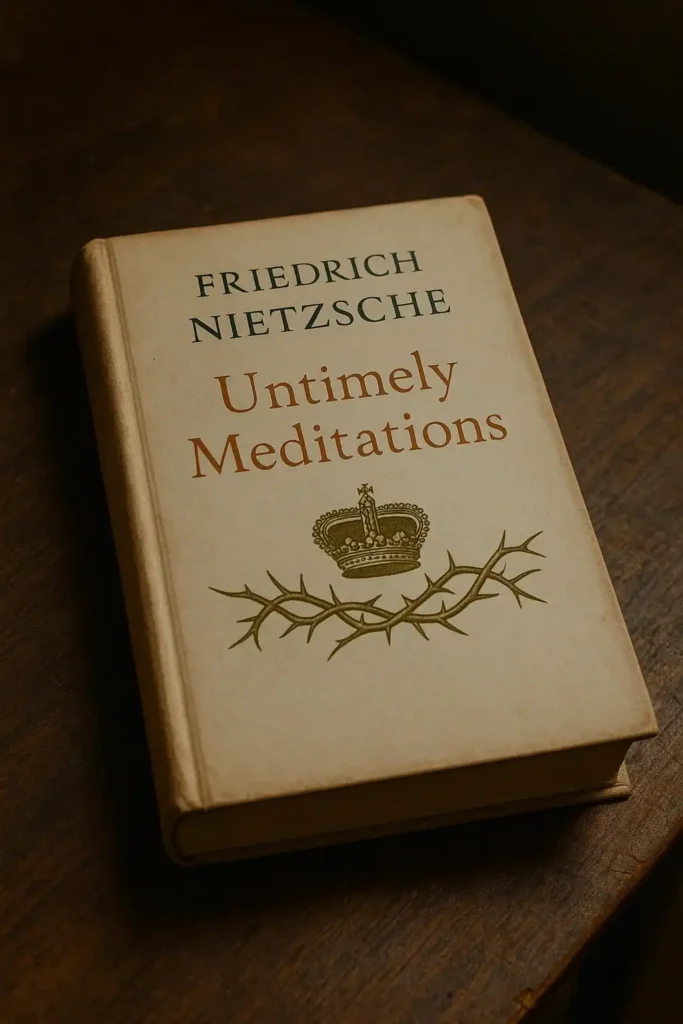I picked up Untimely Meditations after decades of reading philosophical works, drawn by Nietzsche’s reputation as philosophy’s most provocative rebel.
What struck me immediately was how Nietzsche’s youthful fire burns through every page, challenging readers to question everything they accept about education, culture, and intellectual honesty.
This isn’t comfortable reading—it’s designed to disturb your assumptions about learning and thinking. The essays target anyone serious about knowing how culture shapes consciousness and why most people live as intellectual sheep.
Nietzsche’s brutal honesty about German academia and his passionate advocacy for authentic self-development create both the book’s greatest strength and its most challenging aspect. His writing oscillates between brilliant insight and youthful arrogance, forcing readers to separate valuable wisdom from philosophical posturing. The central theme revolves around breaking free from cultural conformity to achieve genuine intellectual independence.
After wrestling with these dense but rewarding essays, I found myself questioning fundamental assumptions about education and personal growth that I’d never examined before. Whether you’ll appreciate Nietzsche’s iconoclastic approach depends entirely on your tolerance for having comfortable beliefs systematically demolished.
Key Takeaways
- Untimely Meditations serves as Nietzsche‘s early cultural manifesto against German intellectual complacency following unification, targeting academics, theologians, and cultural figures who represented what he saw as widespread philistinism and conformity.
- The work presents three essential approaches to history – monumental (inspiring through great examples), antiquarian (preserving tradition), and critical (challenging inherited beliefs) – arguing that healthy cultures require all three in careful balance rather than Germany’s obsessive historical scholarship.
- Nietzsche advocates for authentic philosophical education through genuine mentors like Schopenhauer, emphasizing personal transformation and intellectual independence over institutional knowledge and academic credentials that create “educated philistines.”
- The essays reveal Nietzsche’s evolving relationship with cultural heroes, particularly his complex admiration for Wagner as both cultural revolutionary and potential symptom of the very decay he sought to combat, foreshadowing their later philosophical split.
- The central theme emphasizes breaking free from cultural conformity to achieve genuine intellectual independence, challenging readers to question fundamental assumptions about education, tradition, and personal development that most people accept uncritically.
Publishing Information: Originally published 1873-1876, various modern editions available
Genre: Philosophical Essays/Cultural Criticism
Pages count: 322
Main Essays:
“David Strauss,” “On the Uses and Disadvantages of History,”
“Schopenhauer as Educator,” “Richard Wagner in Bayreuth”
Introduction: Nietzsche’s Cultural Critique
When I first encountered Nietzsche’s Untimely Meditations, I expected another dense philosophical treatise that would challenge my patience more than my thinking. What I discovered instead was a young philosopher’s passionate declaration of war against the intellectual complacency of his era.
The Historical Context of Untimely Meditations
The four essays comprising Untimely Meditations emerged between 1873 and 1876 during Germany’s post-unification cultural transformation. Nietzsche witnessed his nation becoming increasingly obsessed with historical scholarship and cultural self-congratulation following Bismarck’s political victories. The newly established German Empire had developed what Nietzsche saw as an unhealthy relationship with its past and present achievements.
This historical moment shaped every page of these essays. Germany’s newfound political power had bred intellectual arrogance and cultural stagnation. Nietzsche observed his contemporaries drowning in historical knowledge while losing the ability to act decisively in the present.
Nietzsche’s Voice of Dissent in Post-Unification Germany
Reading these essays today, I’m struck by how Nietzsche positioned himself as the lone voice challenging Germany’s cultural direction. His critiques target specific intellectual figures like David Strauss and broader cultural phenomena like historical oversaturation. The young philosopher refused to celebrate his nation’s supposed cultural superiority.
Nietzsche’s dissent wasn’t merely academic criticism—it was a call for cultural revolution. He demanded that Germans abandon their comfortable relationship with inherited traditions and forge new paths forward. This rebellious spirit makes the Meditations feel surprisingly contemporary even though their 19th-century origins.
The Four Essays: Structure and Development
The four essays in “Untimely Meditations” function as interconnected attacks on the cultural complacency that Nietzsche witnessed in post-unification Germany. Originally conceived as part of a thirteen-essay series, these pieces represent the young philosopher’s sustained assault on intellectual mediocrity and cultural self-satisfaction.
David Strauss: Attacking Philistinism in German Culture
I found Nietzsche’s opening salvo against David Strauss to be both ruthless and revealing. Strauss, a prominent Protestant theologian who had written “The Old and the New Faith: A Confession,” becomes Nietzsche’s perfect target for what he sees as German cultural philistinism.
The essay doesn’t simply critique Strauss’s theological positions. Instead, Nietzsche uses him as a symbol of the broader intellectual bankruptcy he observed in German culture. Reading this piece, I was struck by how Nietzsche identifies Strauss as representative of a new type of cultural figure—the educated bourgeois who believes he has transcended traditional religion while actually embracing a bland, homogenized worldview.
| Essay Element | Details |
|---|---|
| Target | David Strauss and “The Old and the New Faith” |
| Main Critique | Cultural philistinism and intellectual mediocrity |
| Writing Style | Humorous but derogatory |
| Cultural Context | Post-unification German self-satisfaction |
On the Use and Abuse of History for Life: Balancing Heritage and Progress
This second essay tackles what Nietzsche saw as Germany’s obsession with historical scholarship at the expense of living culture. Writing this at age twenty-nine while recovering from the academic backlash against “The Birth of Tragedy,” Nietzsche crafted a manifesto against the historicism that dominated German intellectual life.
I appreciate how this essay goes beyond academic disputes to address fundamental questions about how we should relate to our past. Nietzsche argues that excessive historical consciousness can paralyze action and creativity. He advocates for what he calls “the unhistorical” and “the suprahistorical”—ways of engaging with the present that aren’t weighed down by encyclopedic knowledge of the past.
The essay distinguishes between three types of history: monumental, antiquarian, and critical. Monumental history inspires us through great examples from the past. Antiquarian history preserves and reveres tradition. Critical history judges and condemns the past when necessary. Nietzsche argues that a healthy culture needs all three, but in proper balance—something he felt was lacking in his contemporary Germany.
| Historical Type | Function | Risk |
|---|---|---|
| Monumental | Inspires through great examples | Can create unrealistic expectations |
| Antiquarian | Preserves tradition | Can lead to stagnation |
| Critical | Judges and reforms | Can destroy necessary foundations |
What makes this essay particularly powerful is Nietzsche’s recognition that the problem isn’t history itself, but how it’s used. When historical study becomes an end in itself rather than a means to enhance life, it becomes destructive. This insight feels remarkably contemporary as we grapple with similar questions about expertise, tradition, and progress in our own cultural moment.
The essay also contains Nietzsche’s earliest sustained thinking about the relationship between knowledge and action. He recognizes that too much historical consciousness can lead to what he calls “the historical disease”—a condition where people become so aware of the complexity and contingency of all human institutions that they lose the capacity for decisive action or genuine belief.
Nietzsche’s Philosophy of History
The second essay stands as the intellectual centerpiece of the collection, where Nietzsche constructs his revolutionary approach to historical thinking. I found myself completely absorbed by how he dismantles conventional historical scholarship with surgical precision.
Three Approaches to Historical Thinking: Monumental, Antiquarian, Critical
Nietzsche identifies three distinct historical sensibilities that shape how we engage with the past. Monumental history celebrates great achievements to inspire future greatness, while antiquarian history preserves traditions as foundations for cultural identity. Critical history challenges inherited beliefs to free life from the weight of oppressive traditions.
| Historical Approach | Purpose | Benefits | Dangers |
|---|---|---|---|
| Monumental | Inspire greatness through past achievements | Motivates action, provides heroic models | Creates unrealistic expectations |
| Antiquarian | Preserve traditions and cultural continuity | Maintains identity, honors heritage | Leads to cultural stagnation |
| Critical | Challenge and critique inherited beliefs | Enables growth, breaks harmful patterns | Destroys necessary foundations |
What struck me most powerfully was Nietzsche’s recognition that each approach becomes destructive when taken to extremes. He argues that healthy cultures require all three in careful balance, not the dominance of any single perspective.
History’s Proper Role in Serving Life and Culture
Nietzsche’s central argument revolutionizes how we think about historical study itself. History should serve life and culture rather than becoming an academic exercise divorced from human vitality. I was fascinated by his insight that excessive historical consciousness can actually paralyze action and creativity.
The philosopher warns against what he calls the “historical disease” plaguing German culture – an obsession with historical knowledge that prevents decisive action. When I read his description of how historical awareness can lead to cynicism and inaction, I immediately thought of contemporary academic culture’s similar tendencies.
| Historical Relationship | Effect on Life | Cultural Impact |
|---|---|---|
| History serving life | Enhances vitality and creativity | Cultural flourishing |
| Life serving history | Paralysis and cynicism | Cultural stagnation |
| Balanced approach | Informed but decisive action | Healthy cultural development |
His argument that history must be “life-affirming” rather than merely factual challenged my own assumptions about the value of historical scholarship. Nietzsche insists that historical knowledge should give power to rather than overwhelm human existence.
The Philosophical Exemplar
After wrestling with Nietzsche’s critique of historical consciousness, I found myself drawn deeper into his vision of authentic philosophical education. The third essay becomes his most personal meditation on what genuine intellectual mentorship looks like.
Schopenhauer as Educator: The Liberating Force of Genuine Philosophy
Nietzsche presents Arthur Schopenhauer not as a systematic teacher but as a liberating force who breaks through institutional pretenses. I was struck by how Nietzsche describes Schopenhauer’s role: he doesn’t provide answers but destroys false certainties that prevent authentic self-discovery.
The essay reveals Nietzsche’s belief that true education happens through encounter with exceptional individuals who model intellectual courage. Schopenhauer becomes the exemplar because he lived his philosophy rather than merely teaching it. His pessimistic worldview paradoxically freed him from cultural conformity and social expectations.
What resonated most with me was Nietzsche’s insight that Schopenhauer’s greatest gift wasn’t his philosophical system but his demonstration of intellectual independence. He showed how a thinker could stand against prevailing cultural currents without becoming bitter or reactionary.
The True Self vs. Institutional Knowledge
This distinction forms the philosophical heart of the entire collection. Nietzsche argues that institutional education creates pseudo-individuals who mistake accumulated knowledge for genuine wisdom. I found his analysis of this cultural phenomenon particularly relevant to contemporary debates about education.
The essay demonstrates how formal learning often produces what Nietzsche calls “educated philistines” – people who possess cultural sophistication but lack authentic selfhood. They speak fluently about art and philosophy while remaining fundamentally unchanged by their studies.

Art and Cultural Regeneration
The final essay in Nietzsche’s collection reveals his complex relationship with artistic genius and cultural transformation. I found this section particularly interesting because it captures Nietzsche at a key moment when his admiration for Wagner was beginning to fracture.
Richard Wagner in Bayreuth: Artist as Cultural Prophet
Nietzsche presents Wagner as more than a composer—he positions him as a cultural revolutionary capable of awakening German society from its intellectual slumber. I was struck by how Nietzsche portrays Wagner’s operas as vehicles for national spiritual renewal, embodying the kind of changing art that could break through the cultural stagnation he critiques throughout the Meditations.
Yet even as I read Nietzsche’s praise, I could sense the underlying tension that would eventually lead to their dramatic split.
The Tension Between Idealism and Reality in Artistic Creation
What makes this essay fascinating is Nietzsche’s growing awareness of the gap between artistic vision and practical execution. He struggles with Wagner’s grandiose ambitions at Bayreuth, questioning whether such idealized artistic projects can truly transform culture or merely create elaborate spectacles.
This tension foreshadows Nietzsche’s later critique of Wagner as a symptom of cultural decay rather than its cure, making this essay a important document of his philosophical evolution.
Philosophical Significance and Legacy
Reading “Untimely Meditations” reminded me why Nietzsche remains such a key voice in philosophy today. His willingness to challenge everything we take for granted about education, culture and intellectual life feels more relevant than ever in our age of information overload and cultural conformity.
What struck me most was how these early essays already contain the seeds of Nietzsche’s later revolutionary ideas. You can see him developing the critical tools he’d later use to question all our fundamental assumptions about truth morality and meaning.
I’d recommend this collection to anyone ready to have their comfortable beliefs shaken up. It’s not an easy read but it’s the kind of book that stays with you long after you’ve finished forcing you to examine your relationship with culture tradition and your own intellectual development.
These meditations prove that sometimes the most “untimely” voices are exactly what we need to hear.
Pros
- Eloquent, energetic prose style that captivates through aphoristic brilliance
- Profound analysis of history’s proper relationship to living culture
- Masterful deconstruction of cultural mediocrity and academic complacency
- Anticipates key themes of Nietzsche’s later philosophy (will to power, perspectivism)
- The second essay offers a timeless framework for engaging with history
Cons
- Unevenly developed essays—the Wagner piece showing more ambivalence than coherence
- Heavy reliance on German cultural references that can alienate contemporary readers
- Early work showing lingering Schopenhauerian and Wagnerian influences Nietzsche later rejected
- Occasionally excessive polemic against figures like Strauss overshadows philosophical substance
- Incomplete project—originally planned as thirteen essays but only four completed
Final Verdict
I consider Untimely Meditations an essential yet underappreciated masterpiece that reveals the foundational thinking behind Nietzsche’s revolutionary philosophy, offering penetrating cultural criticism that anticipates many concerns of our digital age.
Through its four remarkable essays, I find it showcases the development of one of philosophy’s most distinctive voices and deserves equal attention from serious readers seeking to understand both Nietzsche’s intellectual evolution and the enduring relevance of philosophical cultural critique.
Dionysus Reviews Rating: 8.5/10
Sip The Unknown—Discover Stories You Never Knew You’d Love!
Dionysus Reviews Has A Book For Every Mood
Biography & Memoir
Fiction
Mystery & Detective
Nonfiction
Philosophy
Psychology
Romance
Science Fiction & Fantasy
Teens & Young Adult
Thriller & Suspense
Frequently Asked Questions
What are Nietzsche’s “Untimely Meditations”?
“Untimely Meditations” is a collection of four essays published by Friedrich Nietzsche between 1873 and 1876. The essays critique German culture and intellectual life during the post-unification period, challenging readers to question assumptions about education, culture, and intellectual honesty. Originally planned as part of a thirteen-essay series, these pieces represent Nietzsche’s early assault on cultural complacency and intellectual mediocrity.
What are the four essays in “Untimely Meditations”?
The four essays are: “David Strauss” (critiquing a Protestant theologian as a symbol of intellectual bankruptcy), “On the Uses and Disadvantages of History” (examining how historical thinking should serve life), “Schopenhauer as Educator” (advocating for transformative education through exceptional individuals), and “Richard Wagner in Bayreuth” (exploring artistic genius and cultural transformation through Wagner’s operas).
Why did Nietzsche write “Untimely Meditations”?
Nietzsche wrote these essays to combat the cultural stagnation he observed in post-unification Germany. He criticized the growing obsession with historical scholarship and cultural self-congratulation following political victories. Nietzsche believed this intellectual arrogance led to cultural decay and called for a revolution that would encourage Germans to abandon their complacent relationship with inherited traditions.
What is Nietzsche’s view on education in “Untimely Meditations”?
Nietzsche argues that true education occurs through encounters with exceptional individuals who model intellectual courage, not through institutional learning that creates “educated philistines.” He emphasizes that genuine education should prioritize personal transformation over information acquisition, disturbing and challenging students to confront their deepest assumptions about themselves and their culture rather than simply accumulating knowledge.
How does Nietzsche approach historical thinking in these essays?
In “On the Use and Abuse of History for Life,” Nietzsche identifies three historical sensibilities: monumental (inspiring through great examples), antiquarian (preserving traditions), and critical (questioning inherited values). He warns that each approach becomes destructive when taken to extremes and advocates for balanced integration. His revolutionary argument asserts that history should serve life and culture, not become an academic exercise divorced from human vitality.
What makes “Untimely Meditations” relevant today?
Despite being written in the 1870s, the essays feel surprisingly contemporary due to their rebellious spirit and critique of cultural conformity. Nietzsche’s call for authentic intellectual engagement, his criticism of educational institutions that prioritize information over transformation, and his emphasis on questioning inherited assumptions remain highly relevant to modern discussions about personal growth and the purpose of education.









